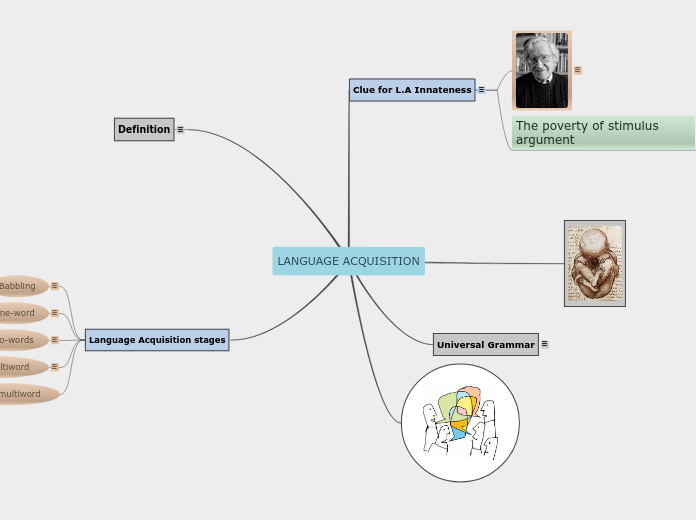LANGUAGE ACQUISITION
Clue for L.A Innateness
Noam Chomsky was first to argue that first language acquisition in human infants proceeds the way it does because we are cognitive predisposed to acquire language.Some clues of language innateness are the overgeneralizing rules that children apply to form past tense verb and plurals>E.g. goed bringed/ mouses foot/ deciba instead of decia (spanish)

Avram Noam Chomsky is an American linguist, philosopher, political scientist and activist. He is emeritus professor of linguistics at the Massachusetts Institute of Technology and one of the most prominent figures of linguistics of the twentieth century, thanks to his work in linguistic theory and cognitive science.
The poverty of stimulus argument
According to Chomsky, the input available to children does not provide enough information alone for the child to learn the complex set of grammatical ruler to produce and understand a language.This is called the poverty of stimulus argument and supports the idea of language innateness and universal grammar.

Universal Grammar
Universal grammar is the set of grammatical rules and principles common to all languages.Clues of universal grammar are the overgeneralizing rules explained before, the fact that children do not learn by imitation or through correction, since they are able to produce words and sentences they have not hear before.

Definition
Language Acquisition is the unconscious process by which humans develop language without instruction.
Language Acquisition stages
Babbling
Age: 4 to 8 months.Patterns: 1. Babies in the babbling stage to produce the same consonant no matter what language they are exposed to:/p.b,t,m,d,n,k,g,s,h,w,j/ 2.Babies produce consonant- vowel patterns: ma ma ma, pa pa pa, da da da, ba ba ba.
one-word
Age: 9 to 18 monthPatterns: This is the one-word stage.Babies produce their own words, mainly nouns and They produce around 50 or more words that are common to their environment.There is a big variability in pronunciation. Some kids may produce the words with adult-like pronunciations while others might be more difficult to understand.
two-words
Age: 18 to 24 monthPatterns: This is the two-word stage.Babies combine words into two-word utterances .Show consistent word order.some examples are: agent + action (mama sleep, dada work) action + thing(kick ball, action + location (sit couch) thing + location (kitty bed) possessor + possession (dada boat) thing + attribute (mama big) determiner+thing (my sock)
early multiword
Age: 24 to 30 monthPatterns: this is the early multi word stageChildren acquire grammatical rules and apply the overgeneralize principles explained previously.\Children use more complex syntactic structure patterns.Children start using question word: where and whatThey create negative sentences with the use of no at the beginning of a more complex construction.E.g. No eat, no porta bien
Late multiword
